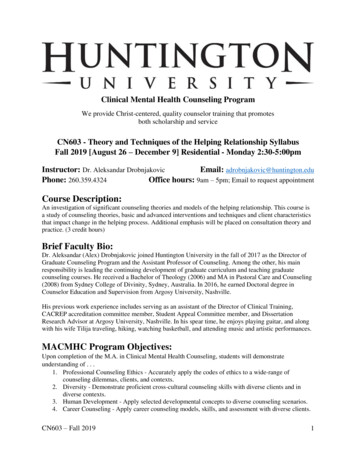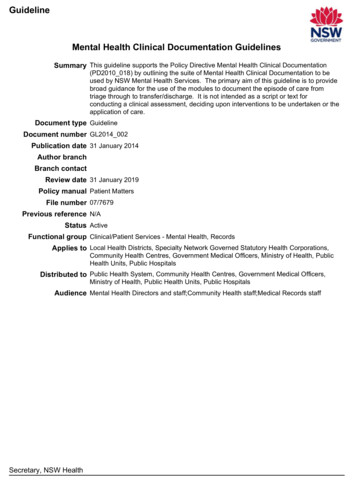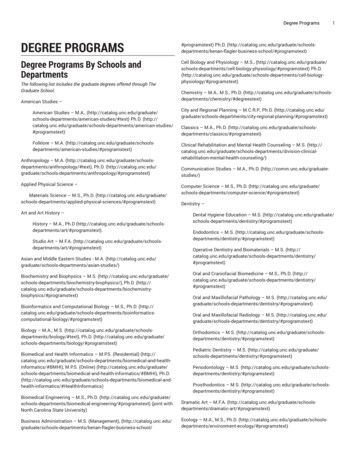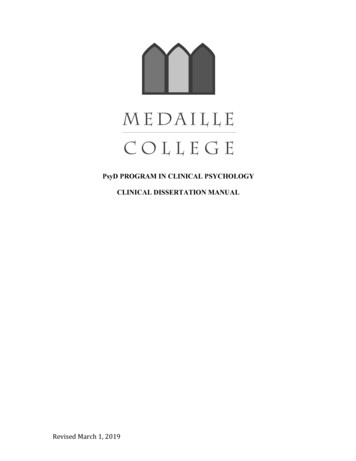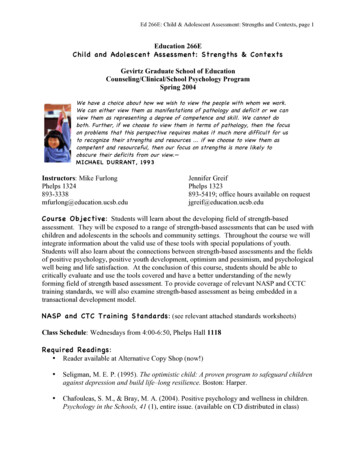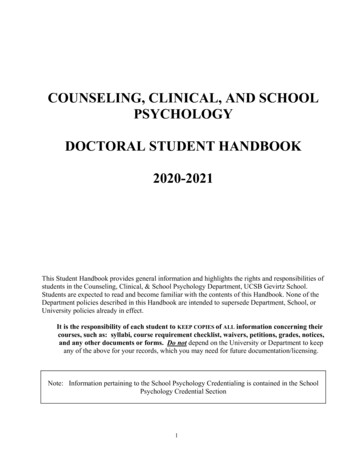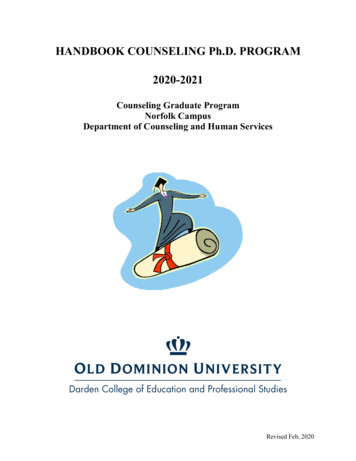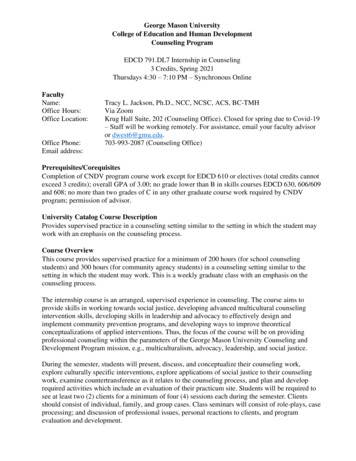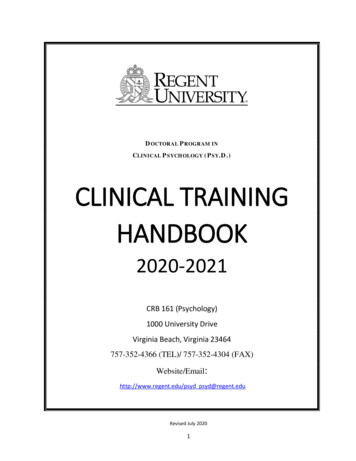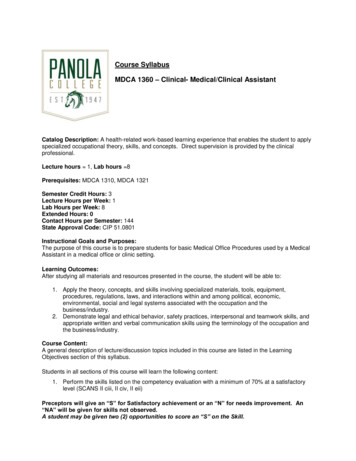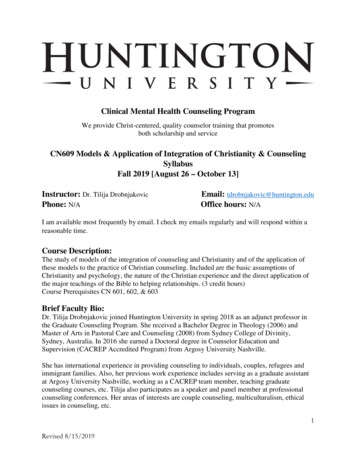
Transcription
Clinical Mental Health Counseling ProgramWe provide Christ-centered, quality counselor training that promotesboth scholarship and serviceCN609 Models & Application of Integration of Christianity & CounselingSyllabusFall 2019 [August 26 – October 13]Instructor: Dr. Tilija DrobnjakovicPhone: N/AEmail: tdrobnjakovic@huntington.eduOffice hours: N/AI am available most frequently by email. I check my emails regularly and will respond within areasonable time.Course Description:The study of models of the integration of counseling and Christianity and of the application ofthese models to the practice of Christian counseling. Included are the basic assumptions ofChristianity and psychology, the nature of the Christian experience and the direct application ofthe major teachings of the Bible to helping relationships. (3 credit hours)Course Prerequisites CN 601, 602, & 603Brief Faculty Bio:Dr. Tilija Drobnjakovic joined Huntington University in spring 2018 as an adjunct professor inthe Graduate Counseling Program. She received a Bachelor Degree in Theology (2006) andMaster of Arts in Pastoral Care and Counseling (2008) from Sydney College of Divinity,Sydney, Australia. In 2016 she earned a Doctoral degree in Counselor Education andSupervision (CACREP Accredited Program) from Argosy University Nashville.She has international experience in providing counseling to individuals, couples, refugees andimmigrant families. Also, her previous work experience includes serving as a graduate assistantat Argosy University Nashville, working as a CACREP team member, teaching graduatecounseling courses, etc. Tilija also participates as a speaker and panel member at professionalcounseling conferences. Her areas of interests are couple counseling, multiculturalism, ethicalissues in counseling, etc.1Revised 8/15/2019
MACMHC Program Objectives:Upon completion of the M.A. in Counseling, students will demonstrate an understanding of . . .1. Professional Counseling Ethics - Accurately apply the codes of ethics to a wide-range ofcounseling dilemmas, clients, and contexts.2. Diversity - Demonstrate proficient cross-cultural counseling skills with diverse clientsand in diverse contexts.3. Human Development - Apply selected developmental concepts to diverse counselingscenarios.4. Career Counseling - Apply career counseling models, skills, and assessment with diverseclients.5. Counseling Models - Develop a sufficient counseling model for working a broad range ofclients.6. Counseling Skills - Demonstrate proficient counseling skills in working with a broadrange of clients.7. Group Work - Demonstrate proficient leadership skills in the facilitation of a group.8. Assessment - Design and conduct several selected assessment processes for counselingscenarios.9. Research - Design counseling-oriented research or program evaluation.10. Integration - Develop an initial, integrated counseling model. Evidenced ethicalintegration of Christian faith in working with diverse clients and in diverse contexts.11. Spiritual Formation - Develop a secure attachment with God.Student Learning Outcomes (SLO):Upon completion of this course, students should be able to:Course ObjectivesCACREP CoreStandards1.Discuss the relevance of a disciplinary background to his/her approach torelating Christianity, psychology, and counseling.2.F5.b; 2.F5.c2.Dialogue the relevance of an Augustinian framework to his/her approachto relating Christianity, psychology, and counseling.2.F.1.a5.C.1.a; 5.C.1.b3.Articulate the Gospel as the foundational metanarrative for his/herapproach to relating Christianity and counseling.Articulate a Christian worldview as foundational for his/her approach torelating Christianity, psychology, and counseling.Describe a Christian moral vision as his/her model of identity in his/hersystem of psychology and counseling.Apply the ACA Code of Ethics as largely an expression of a broaderChristian ethic (except where conflict occurs) for his /her system ofpsychology and counseling.Articulate a relational paradigm for his/her system of psychology andcounseling consistent with his/her philosophical foundations.2.F.2.g5.C.2.a2.F1.a; 2.F2.d2.F.2.g2.F.1.i5.C1.a; 5.C.1.b5.C.1.b2.F.1.i5.C.2.l2.F1.a; 2.F.2.d5.C1.a;5.C.1.bCreate an inclusive counseling model consistent with his/her philosophicalfoundations and relational paradigm.Practice selected, Christian strategies, interventions, and techniquesconsistent with his/her inclusive counseling model.2.F.2.g; 2.F.5.n5.C.1.b2.F.2.b; rds5.C.1. b2Revised 8/15/2019
The following CACREP standards are addressed in this course:CACREP II.F.1.a, i; II.F.2.b, d, g; II.F.5.c, g, j, n; 5.C.1.a,b; 5.C.2.a; 5.C.3.b1. History and philosophy of the counseling profession and its specialty areas. (CACREPII.F1.a)2. Ethical standards of professional counseling organizations and credentialing bodies, andapplications of ethical and legal considerations in professional counseling. (CACREP II.F1.i)3. Theories and models of multicultural counseling, cultural identity development, and socialjustice and advocacy. (CACREP II.F2.b)4. The impact of heritage, attitudes, beliefs, understandings, and acculturative experiences on anindividual’s views of others. (CACREP II.F2.d)5. The impact of spiritual beliefs on clients’ and counselors’ worldviews. (CACREP II.F2.g)6. Theories, models, and strategies for understanding and practicing consultation. (CACREPII.F5.c)7. Essential interviewing, counseling, and case conceptualization skills. (CACREP II.F5.g)8. Evidence-based counseling strategies and techniques for prevention and intervention.(CACREP II.F5.j)9. Processes for aiding students in developing a personal model of counseling. (CACREPII.F5.n)10. History and development of clinical mental health counseling. (CACREP 5.C1.a)11. Theories and models related to clinical mental health counseling. (CACREP 5.C1.b)12. Roles and settings of clinical mental health counselors. (CACREP 5.C2.a)13. Techniques and interventions for prevention and treatment of a broad range of mental healthillnesses. (CACREP 5.C3.b)Required Course Texts and ReadingsStudents are responsible for acquiring the following books and materials for this course by thetime the course begins:American Psychiatric Association (2013). Diagnostic and statistical manual of mental disorders(5th ed.). Arlington, VA: American Psychiatric Publishing. ISBN # 978-0890425565American Psychological Association. (2010). Publication manual of the American PsychologicalAssociation (6th ed.). Washington, DC: Author.Johnson, E. L., and Jones, S.L. (2010). Psychology and Christianity: Five Views. DownersGrove, IL: InterVarsity. ISBN: 978-0830828487McMinn, M. (2011). Psychology, theology, and spirituality in Christian counseling. Wheaton,IL., Tyndale House Publishers. ISBN: 978-0842352529Required ArticlesAmerican Counseling Association. (2014). ACA code of ethics. Alexandria, VA: Author.Retrieved from thics.pdfAmerican Association of Christian Counselors (2014). AACC code of ethics. Retrieved ERVIC. Association for spiritual, ethical, and religious values in counseling. (2009). Spiritualcompetencies: Competencies for addressing spiritual and religious issues in counseling.3Revised 8/15/2019
Retrieved fromhttps://www.google.com/url?sa t&rct j&q &esrc s&source web&cd 2&ved 0ahUKEwi40P8kPjXAhUs IMKHdIRBQcQFggpMAE&url Fsfvrsn%3D8&usg AOvVaw2QS6g8qwtYTatlnUQHfnxXBergin, A. (1980). Psychotherapy and religious values. Journal of Consulting and ClinicalPsychology, 48, 95-105.Chappelle, W. (2000). A series of progressive legal and ethical decision-making steps for usingChristian spiritual interventions in psychotherapy. Journal of Psychology & Theology,28, 43-53.Christopher, J. C. (1996). Counseling’s inescapable moral vision. Journal of Counseling &Development, 75, 17-25.Ellis, A. (1980). Psychotherapy and atheistic values. Journal of Consulting and ClinicalPsychology, 48, 635-639.Garzon, F. (2005). Intervention that apply scripture in psychotherapy. Journal of Psychology andTheology, 33, 113 -121.Jones, S. L., Miguélez L., and Butman, R. E. (2011). A Christian View of Persons. In S. L. Jonesand R. E. Butman (Eds.), Modern psychotherapies: A comprehensive Christianappraisal. (2nd ed.) (pp. 60-93). Downers Grove, IL: InterVarsity.Johnson, E.L. (2004). Towards a philosophy of science for Christian psychology. Edification:Journal of the Society for Christian Psychology, 7, 5-20.McMinn, M.R., Staley, R.C., Webb, K. C., and Seegobin, W. (2010). Just what is Christiancounseling anyway? Professional Psychology: Research and Practice, 41, 391- 397.Retrieved ontent.cgi?article 1121&context gscp facMattox, J. M. (n.a.). Augustine: Political and social philosophy. Retrieved fromhttps://www.iep.utm.edu/aug-poso/Monroe, P. (2008). Guidelines for effective use of the Bible in counseling. Edification Journal ofof the Society for Christian Psychology, 2, 53-61.National Board of Certified Counselors (2013). NBCC code of ethics. Greensboro, NC: Author.Retrieved from e, S. (1989). The role of exorcism in clinical practice and pastoral care. Journal ofPsychology and Theology, 17, 121-131.Tan, S.Y. (2003). Inner healing prayer. Christian Counseling Today, 11, 20-22.Tan, S. Y. (1996). Religion in clinical practice. In E. Shafranske (Ed.), Religion and the clinicalpractice of psychology (pp. 365-387). Washington, D.C.: APA.Tjeltveit, A. C. (2013). Psychotherapy and Christian Ethics. In R.K. Sanders (Ed.), ChristianCounseling Ethics: A handbook for psychologists, therapist, and pastors (2nd ed.), (pp.3358). Downers Grove, IL: Intervarsity.Worthington, E., Jennings, D., and DiBlasio, F. (2010). Interventions to promote forgiveness incouple and family contexts: Conceptualization, review, and analysis. Journal ofPsychology and Theology, 38, 231 – 245.4Revised 8/15/2019
Recommended (not required) Readings and ResourcesMcMinn, M., and Campbell, C. D. (2007). Integrative psychotherapy: Toward a comprehensiveChristian approach. Downers Grove, IL: InterVarsity Press.Method of Instruction and Course RequirementsThis class includes course material supplementing and expanding on textbook knowledge, classdiscussion, case presentations skill-building exercises, and other teaching methods utilized tomonitor and facilitate students’ self-awareness, professionalism, and the integration of academicand experiential learning. Assignments include individual and/or group projects. Students areexpected and encouraged to actively participate in this learning experience.1. Discussion Questions (DQ):Students are expected to engage in graduate-level class participation that includes regularonline class attendance and involvement with peers through online discussions. Specifics ofthe week are given which may include questions, articles to read and evaluate, onlineresources to review and/or videos to view as part of participation in the weekly discussionforum. Follow directions in each weekly discussion forum. Students will write an initialDiscussion Question (DQ) due by 11:59 pm EST the Thursday of the assigned week and willsubmit at least one response to classmates by 11:59 pm EST on the Sunday of the assignedweek. Initial posts should be between 300-400 words. Response posts should be between200-250 words each. Attachments are not permitted. Responses should include (respectful)critical analysis of the posts, seek additional clarification, generate further discussion, orprovide additional perspectives for consideration. Note: Out of respect for one another, whena peer responds with a question or prompting further reflection from you, ensure that you“close” the conversation with a response. This may mean that you end up posting more thanthe minimum requirements. Posts will be evaluated for both content and APA format usingthe grading rubric below.Discussion Question Grading tinguishedQuantity andTimeliness.Does not submitat least oneinitial post orresponses by thedeadline.Posts responses ontime but does notsubmit at least oneinitial post by thedeadline.Submits at leastone initial postbut not theresponse posts bythe deadline.Submits at least oneinitial post and allresponses by thedeadline./3pts.Relate to key ideas ina meaningful manner.Responsecontains noreference to keyideas.Key ideas arepresent, but there isno evidence thelearner understoodideas.Makes referenceto key ides, but ina superficialmanner.Relates to key ideasin a meaningfulmanner./3pts.5Revised 8/15/2019
Demonstratesknowledge andunderstanding ofcontent andapplicability toprofessional practiceNo evidence ofintegration ofcourse content.Post(s) andresponses showlittle evidence ofknowledge andunderstanding ofcourse content andapplicability toprofessionalpractice.Post(s) andresponses showevidence ofknowledge andunderstanding ofcourse contentand applicabilityto professionalpractice.Write in a clear,concise, andorganized mannerusing APA styleincluding references,and citations;demonstrated ethicalscholarship inaccuraterepresentation andattribution of sources,displayed accuratespelling, grammar,mechanics, andpunctuation.Engage in scholarlydiscussion with peerswhen prompted withreplies that are topicrelevant, meaningful,and include correctlycited references.Submits poststhat are poorlywritten and mayuse some termsincorrectly.APA style.Does not submitposts that areincompletesentences. Or twoor more of thecomplete sentencesare grammaticallyincorrect and havegreater than 2spelling errors.APA style.Submits posts thathave one or moregrammaticallyincorrectsentences and twospelling errors.APA style.Does not engagein meaningfuldiscussion withpeers whenprompted.Engages indiscussion withpeers whenprompted, butreplies are notrelevant to the topicand nonmeaningful.Engages indiscussion withpeers whenprompted andreplies are topicrelevant andmeaningful.Post(s) andresponses showevidence ofknowledge andunderstanding ofcourse content andapplicability toprofessional practiceand include otherresources thatextend the learningof the community.Submits posts thatcontaingrammaticallycorrect sentenceswithout any spellingerrors. Proper use ofAPA style./3pts.Engages in scholarlydiscussion withpeers whenprompted withreplies that are topicrelevant,meaningful, andinclude references tothe literature./3pts./3pts./15pts.Total2. Required Assignments (RA):Required Assignments (RAs) are substantive assignments intended to measure studentperformance against selected course objectives and/or program outcomes within a course. Eachof the three RA contributes to a significant portion of the overall course grade and is assessed byfaculty using the grading criteria designed for that assignment. These are individual assignmentsand students earn individual grades.Week 3: Required Assignment 1 (RA1): Differences between ACA Code of Ethics (2014)and AACC Code of Ethics (2014). Worth 160 pts.Description: There are many differences between the ACA Code of Ethics (2014) and AACCCode of Ethics (2014). Compare and contrast two ethical codes.6Revised 8/15/2019
Directions: In this paper, you will identify:Part I How the two codes talk about counselors as they manage their own value systems withtheir clientele. How both codes address the matter of multiple or dual relationships. How the two codes address the issue of competence.Part IIIn this part, you will identify how these differences /codes of ethics influenced your model ofidentity in your system of psychology and counseling.Your final product will be in a Word document and be approximately 4-5 pages in length plustitle page, reference page (APA style); utilizing 3-4 different scholarly sources. Your papershould be written in a clear, concise and organized manner; demonstrated ethical scholarship inaccurate representation and attribution of sources; a display accurate spelling, grammar, andpunctuation.Upload RA 1 in Moodle by Sunday 09/15/19 by 11:59 PM (EST).RA 1 Grading Criteria:CACREP Core: 2.F1.iAssignment ComponentsProficientHow the two codes talkabout counselors as theymanage their own valuesystems with their clientele.A well – organized anduseful information abouthow the two codes talkabout counselors as theymanage their own valuesystems with their clienteleis developed.A clear and logical summary isgiven regarding how both codesaddress the matter of multiple ordual relationships. Scholarlyreferences are utilized.How the two codes addressthe issue of competence islogically discussed?Scholarly references areutilized in support.How the differences betweenthese codes of ethics influencedyour model of identity in yoursystem of psychology andcounseling is clearly discussed.How both codes address thematter of multiple or dualrelationships.How the two codes address theissue of competence.Identify how the differencesbetween these codes of ethicsinfluenced your model ofidentity in your system ofpsychology and counseling.Max Points/35 pts./35 pts./35 pts./35 pts.7Revised 8/15/2019
Scholarly references are utilizedin support.Academic WritingWrite in a clear, concise,and organized manner;demonstrate ethicalscholarship in accuraterepresentation andattribution of sources (i.e.APA); and display accuratespelling, grammar, andpunctuation.TotalWritten in a clear, concise,and organized manner;demonstrated ethicalscholarship in appropriateand accurate representationand attribution sources; anddisplayed accurate spelling,grammar, and punctuation.Use of scholarly sourcesaligns with specifiedassignment requirements./20 pts./160 pts.Week 4:Required Assignment 2 (RA2): The Role of Religion and Culture in Diagnosis [160 pts.]Description: The DSM-5 supports the consideration of the effects of cultural variables on thediagnostic process. In this assignment, you will identify and describe potential cross-culturalissues affecting diagnosis and provide culturally and religious sensitive treatmentrecommendations and risk assessment. In addition, in your response, you will provide anaccurate diagnostic profile, which includes your diagnostic rationale.Case Scenario:John is a 42-year-old, Hispanic male who has been referred to you by his psychiatrist forcounseling. During the initial session, John reports he experiences overwhelming anxiety. Hecurrently takes the following psychotropic medications: Tegretol, Wellbutrin, Vistaril, andElavil. According to John, he was diagnosed with Type I diabetes two years ago for which hetakes medication. John says gender identity is an important topic for him because he feels he is afemale, although he is a biological male. He reports becoming aware of his feelingsapproximately 15 years ago but states he has not begun hormone replacement therapy due to hisfamily’s negative response to him feeling he is female. There is no discussion of this topic in thefamily, or with others in the community leaving John feeling like an “outcast”.John also reports feeling uncomfortable around others, particularly in one-to-one situations. Hedescribes himself as feeling “pretty good” with small groups of people. When he feels anxious hefeels his heart pounding, believes others are watching him because they can tell he is anxious,sweats, his mind races, he cannot organize his thoughts, and he perceives events as occurring “ina dream”. He is afraid he may have one of these “attacks”; therefore, he tries to avoid goingplaces without a family member or a very close friend. He tends to spend much of his time athome because of his symptoms, the family’s limited financial resources and lack oftransportation. He relies on public transportation or church members to go to appoin
at Argosy University Nashville, working as a CACREP team member, teaching graduate counseling courses, etc. Tilija also participates as a speaker and panel member at professional counseling conferences. Her areas of i
